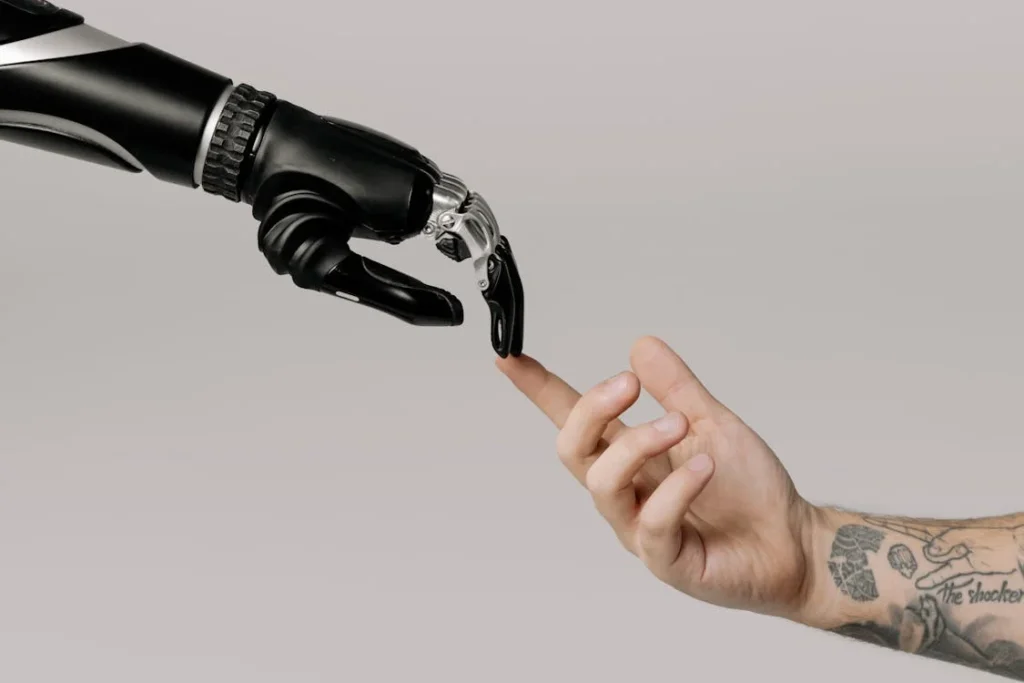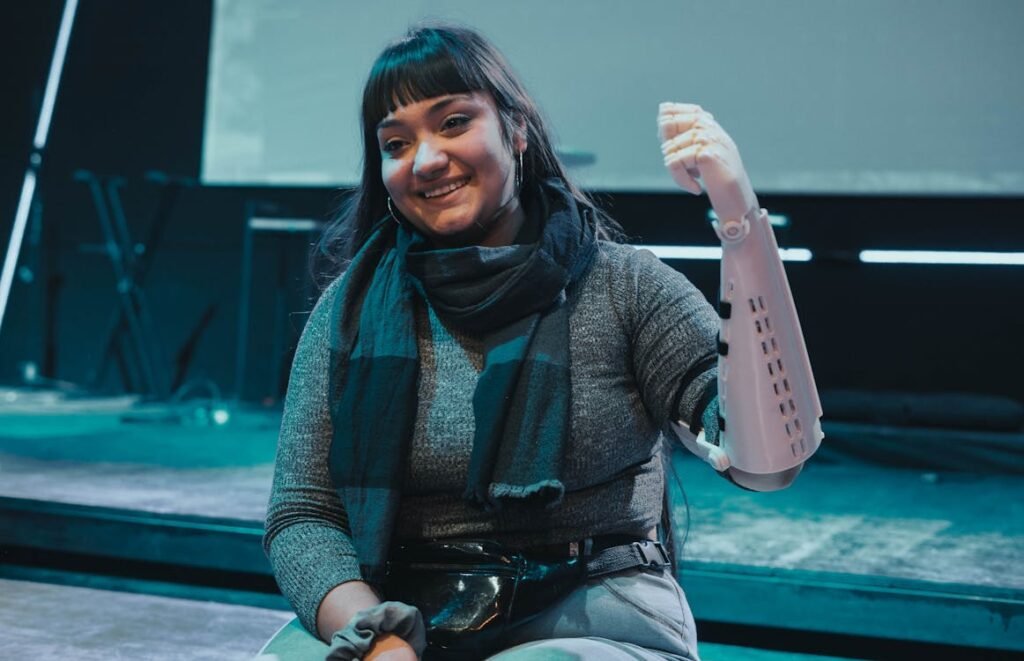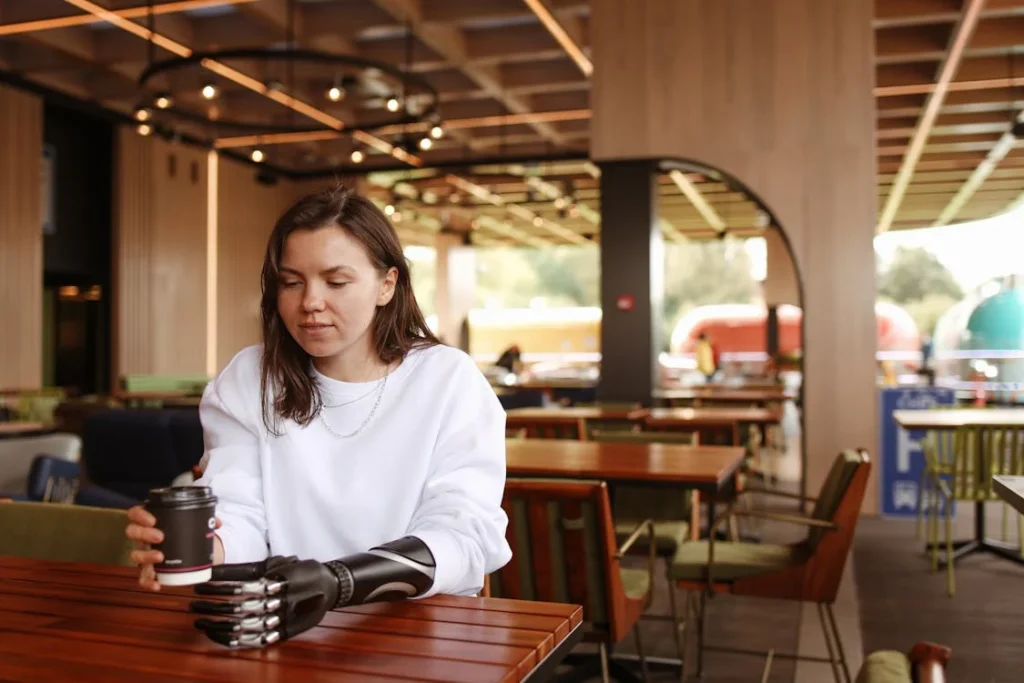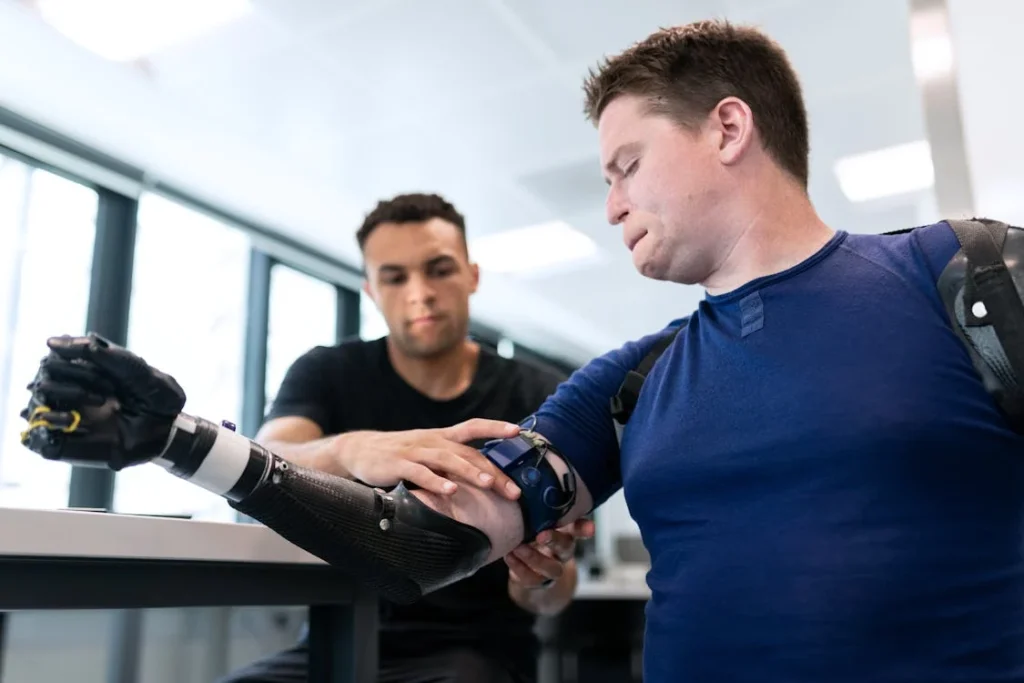Rehabilitation after limb loss is not just about healing. It’s about rebuilding your life—step by step, grip by grip. And the hardest part of that journey? Staying consistent. Many people start strong. They commit to daily training. They promise themselves they’ll get better. But over time, the spark fades. The exercises feel the same. The progress feels slow. And soon, it’s harder and harder to keep going.
But what if rehab didn’t feel like rehab? What if it felt like a game?
At RoboBionics, we’ve seen how powerful rehab games can be. They turn everyday exercises into something fun, something exciting, something you want to do. And that changes everything. Instead of pushing yourself to train, you look forward to it.

Why Games Make Rehab Easier to Stick With
Turning Effort Into Enjoyment
Rehab is usually serious business. There are routines to follow. Exercises to repeat. And goals to reach. But doing the same movement over and over again can get dull, especially when results take time. That’s where games come in.
Games flip the script. They take those same exercises and wrap them in something joyful. Instead of just squeezing your hand or lifting your fingers, you’re guiding a rocket through the sky. You’re popping bubbles. You’re moving a character past obstacles. It feels less like therapy and more like adventure.
This change is more than emotional—it’s neurological. When we enjoy an activity, our brain releases chemicals like dopamine. These feel-good signals make it easier to stay engaged. They also help the brain learn faster. So not only are you more likely to do the exercise—you’re more likely to improve while doing it.
We see this daily with users of the RoboBionics gamified rehab app. When therapy becomes play, people don’t need to be reminded to train. They want to train. They wake up looking forward to their session. That’s the magic of a well-designed game.
Gamified Feedback Feels Like Real Progress
Another reason games work so well is because they give instant feedback. In traditional rehab, progress can feel invisible. You might be improving your strength or flexibility, but you can’t always tell. That makes it hard to stay motivated.
Rehab games fix that. When you complete a level or beat your score, you get immediate proof that you’re moving forward. You can see your hand getting faster. You can feel your grip getting stronger. That feedback loop keeps your confidence high—even when the gains are small.
This kind of feedback is especially important for amputees learning to use a prosthetic like the Grippy™ Hand. In the early days, it’s easy to feel unsure. Your muscles are still adjusting. The movements feel unfamiliar. But when the app shows that your balloon went higher or your score improved, you get a boost. You think, I did that. And that one thought keeps you coming back.
Games Help Build Muscle Memory Naturally
Rehabilitation is all about repetition. You need to repeat certain motions—grips, extensions, pinches—until they become smooth and automatic. But repetition is hard when it feels boring.
Rehab games solve this by hiding the repetition inside play. You don’t even realize you’re doing the same motion 20 times, because you’re trying to reach the next level or catch the next falling star. This makes the training feel less like a chore and more like a challenge.
With regular play, these movements start to sink in. Your brain gets better at sending signals to your muscles. Your hand gets better at responding. And over time, what once felt slow or awkward becomes natural.
This is exactly how kids learn to walk, run, or play sports—they repeat through play. We simply apply that same idea to adult rehab.
Different Games for Different Needs
Not every game fits every goal. That’s why our rehab app includes different types of challenges—each designed to work on specific skills.
If someone needs to strengthen their grip, there are games where you control objects by squeezing. If someone is relearning finger coordination, there are puzzles that respond to individual finger movement. If speed is the goal, there are time-based games that reward faster reactions.
Each of these games trains something different—but they all follow the same logic: make rehab feel fun, give clear feedback, and reward effort.
And the best part? As your ability improves, the games adjust. They become more challenging, more rewarding. They grow with you. That keeps things fresh and exciting, week after week.
Rehab Games Also Help Reduce Fear
For many new users of prosthetic devices, there’s fear. Fear of failure. Fear of pain. Fear of not getting it right.
Games gently reduce that fear. Because games don’t judge. They don’t scold. They don’t say “you did it wrong.” They simply encourage you to try again. And again. Until you win.
This safe space makes people more willing to experiment. More willing to move. More willing to learn. And learning is what rehab is all about.
We’ve had users tell us they were afraid to move their new bionic hand in public—but after a few weeks of daily gaming, they felt ready. Not just physically, but mentally. Because games helped them build not only skills—but courage.

Rehab Games That Work With the Grippy™ Hand
Making the Grippy™ Hand Feel Natural Through Play
Learning to use a bionic hand like the Grippy™ is not just about technology. It’s about trust. Your muscles need to trust that when they send a signal, the hand will move. Your brain needs to trust that when you try, something will happen. That trust only comes through repetition—and repetition becomes easier when it’s part of a game.
With our rehab app, Grippy™ users start with games that match their current ability. In the early stages, even a small movement can trigger a response in the game. A balloon floats. A light flashes. A character jumps. These small reactions tell the user, “Yes, your hand is working.” That’s powerful feedback.
As strength and control improve, the games offer more complex challenges. Now the balloon needs to stay in the air for longer. Or the character must dodge obstacles. These shifts happen gradually, so users never feel overwhelmed. They grow with the game, one day at a time.
This helps Grippy™ users feel more connected to their prosthetic. It no longer feels like a tool strapped to the arm. It begins to feel like part of the body—responding, reacting, and helping them play, just like a natural hand would.
Games That Build Finger Precision for Everyday Life
One of the most requested rehab features we hear from users is support for finger control. Tasks like picking up a coin, tying shoelaces, or opening a bottle all require fine motor skills. That’s why some of the best rehab games for amputees focus on finger precision—not just strength.
Our games include small on-screen tasks that need careful control. You might have to pinch a tiny object, tap a flashing light, or guide a line through a narrow path. These games don’t just keep users engaged—they teach subtlety. They help users learn how to control different levels of grip pressure and finger movement, which is exactly what real life demands.
In one of our most popular games, users must collect stars that appear randomly across the screen. The stars respond to soft grips, quick taps, or slow holding patterns. Each action mimics a real-world task—like turning a page or buttoning a shirt. And because the game gives instant feedback, users learn quickly what works and what doesn’t.
Over time, the skills gained in the game move from screen to life. What starts as play becomes practical. That’s the kind of training that sticks.
BrawnBand™ and Gaming: A Perfect Combo
Another powerful way to enhance gaming-based rehab is by using it alongside the BrawnBand™, our electronic muscle stimulator. The BrawnBand™ helps activate and strengthen muscles, even in users who haven’t used them in a long time.
When paired with the rehab app, the BrawnBand™ can supercharge learning. Users wear the band during gameplay. As the app tracks hand signals, the BrawnBand™ boosts muscle activity, helping the brain and body connect faster.
Imagine playing a grip-based game. You’re trying to pop virtual bubbles by squeezing your hand. With the BrawnBand™ gently stimulating your forearm muscles, your grip becomes stronger. You pop more bubbles. You see success sooner. And because success feels good, you keep going.
This loop—stimulus, movement, reward—is exactly what habit loops are made of. And it’s what keeps users consistent, excited, and improving day after day.
We’ve seen incredible stories from users who struggled to control their muscles for months—until they started using the BrawnBand™ during rehab games. Suddenly, their fingers responded. Their hand felt alive. That kind of progress builds belief. And belief builds routine.
Motivating Progress Through Game-Based Levels
One thing that makes rehab hard is that results take time. You might work for weeks before you feel a difference. That slow pace can be discouraging.
Our games tackle that challenge with a built-in leveling system. Every time users complete a task, they earn points. Every few points, they “level up.” This isn’t just a gimmick. It gives users a clear sense of momentum.
You may not notice your grip is stronger—but if you see that you moved from Level 2 to Level 5 in a week, that tells you you’re doing something right.
Leveling up also unlocks new game modes, new visuals, and new challenges. It’s like opening a door each week. There’s always something new to try. Something fresh to explore. This stops boredom from creeping in.
Most importantly, it gives users a reason to come back tomorrow. And the day after that. Until daily training becomes daily living.

The Psychology Behind Rehab Games That Work
Why the Brain Responds to Play Better Than Pressure
The human brain is wired to seek rewards. It lights up when we win, when we progress, and when we feel seen. Traditional rehab often relies on discipline and repetition. But for many, especially those going through something as emotionally heavy as limb loss, that approach doesn’t always work. It can feel like pressure. And pressure can quickly turn into stress, frustration, or even guilt.
That’s why rehab games succeed where traditional methods sometimes fall short. Games replace pressure with play. They turn rehab into something the brain enjoys. And when the brain enjoys an activity, it wants to repeat it.
This is known as “positive reinforcement.” Every time you play a game and succeed—even a small win like collecting a coin or finishing a level—your brain releases dopamine. That tiny rush feels good. It says, Do this again. Over time, that loop creates a powerful habit. You stop needing motivation. You just show up because your brain wants to.
Rehab games tap into this natural reward system. Instead of forcing yourself to do the hard thing, you find yourself wanting to play. And every play is another step in your recovery.
Reducing Mental Fatigue Through Flow
Rehab fatigue is real—and not just physical. Mentally, doing the same exercises over and over can wear you down. It’s not that the body can’t keep going—it’s that the mind gets bored. This boredom creates resistance. It makes you hesitate. Skip a day. Then two.
Games offer something powerful here: a mental state called “flow.” Flow happens when you’re focused, challenged just enough, and completely engaged. It’s the feeling you get when you’re so into a task that time flies.
Our rehab games are built to create flow. They start easy, then grow harder at just the right pace. They challenge you, but they never overwhelm. This balance keeps you in the sweet spot—engaged, not exhausted.
And the more time you spend in flow, the faster you learn. The deeper your muscle memory grows. The more joyful rehab becomes.
That’s why users often tell us, “I didn’t even notice how long I was training.” That’s flow. And that’s how you stick with it.
How Games Help Overcome Fear of Failure
One of the quietest barriers to rehab is fear—especially for amputees using a new device. You’re learning how to move again. How to hold, grip, and touch. It’s unfamiliar. And unfamiliar can feel scary.
In a clinical setting, some users hesitate. They worry about getting it wrong. About looking weak. About failing in front of someone else.
But games don’t judge.
If you miss a target or drop a ball in the game, nothing bad happens. The screen just resets. You try again. The world doesn’t laugh. It cheers.
That safety matters more than we realize. It gives users permission to explore, to test, to learn. Without shame. Without fear.
This emotional safety leads to faster progress. When users aren’t afraid to fail, they try more. And more trying means more success.
We often see users who were hesitant to even activate their Grippy™ Hand in the clinic now playing confidently at home—smiling as they guide a boat through virtual waves. That’s not just physical progress. That’s emotional healing.
The Role of Visual and Audio Cues in Training
Our senses shape how we experience the world—and how we learn. Rehab games that include visual cues, audio signals, and tactile feedback help speed up that learning.
Let’s say you grip your hand and a balloon lifts on the screen. That’s a visual cue. If you hear a sound when it pops, that’s an audio cue. If the game reacts with confetti or a badge, that’s a reinforcement.
These signals work together to strengthen your understanding. They help the brain say, When I do this, something good happens.
Over time, these cues build rhythm. Your body learns the timing. Your muscles follow the flow. The game becomes not just fun—but training that teaches.
Even users with low literacy or no rehab experience can follow the games. The screen guides them. The sounds encourage them. The rewards keep them coming back.
That’s why we say: the best rehab tools don’t just work. They feel right.
Creating an Emotional Bond With Progress
Most people don’t stick to rehab because they forget the pain or the problem. They stop because they forget the progress.
Games change that.
Each level completed, each score beaten, each new movement unlocked—it’s proof that you’re getting better. You don’t need a therapist to say, “You improved.” You see it. You feel it.
This emotional connection builds pride. You remember the moment your virtual plane took off. The day you held down a grip long enough to win a race. These memories become anchors. They remind you why you started—and why you want to keep going.
It’s this connection that makes rehab feel less like recovery, and more like reclaiming your life.

Daily Rehab Games That Fit Real Life
Rehab That Works in Short Bursts
One of the biggest reasons people skip rehab is time. Life gets busy. There’s work to do, errands to run, meals to cook. Setting aside a long rehab session every day just doesn’t feel possible. And when rehab starts to feel like a big task, people start to avoid it.
That’s why we designed our rehab games to work in short bursts.
You don’t need an hour. You don’t even need 30 minutes. Most game sessions in our app take just 5–10 minutes. But those few minutes are packed with movement, coordination, and focus. They give your body what it needs—without taking too much from your day.
You can play during a tea break. Or while waiting for a bus. Or just before bedtime. That flexibility makes it easier to stick with the habit. You fit the rehab into your life—not the other way around.
This is especially helpful for people living in joint families, managing kids, or working long shifts. Rehab stops feeling like a burden. It becomes part of your rhythm.
Adapting to Energy Levels and Mood
Some days, you wake up full of energy. You’re ready to train hard. Other days, even lifting your arm feels like too much. That’s normal. And it’s why rehab needs to meet you where you are—not where someone else expects you to be.
Our games are designed to adjust.
If you’re having a low-energy day, you can play a lighter game. Something that uses simple movements. Just open and close your hand. Move your wrist. Watch a balloon float or a fish swim.
If you’re feeling stronger, the app offers more dynamic challenges. Games that push your speed, accuracy, and grip strength.
This ability to choose based on your energy makes a huge difference. It keeps you moving, even on the hard days. And it helps protect your progress from breaking down after a small setback.
You don’t have to do a lot every day. You just have to do something. And with these flexible games, that “something” is always within reach.
Rehab Games for Indoors and Outdoors
Not everyone has a private room or clinic space for rehab. In many Indian homes, space is limited. There might be noise, visitors, or other people using the area. Some people live in small apartments. Others in village homes with shared spaces. That’s real life.
Our rehab games were built with this in mind. They work anywhere.
You can play indoors, sitting on a bed, on a chair, or even on the floor. The screen is bright enough to see even in daylight. The touchpoints are large. The sounds are clear but not disturbing. You don’t need special lighting or equipment.
If you prefer the fresh air, take it outdoors. Sit on your porch or under a tree. As long as your device is charged, the game works.
And since many of our games don’t need internet after setup, there’s no worry about poor signal or Wi-Fi. That offline feature matters deeply to our rural users—and it’s something we’re proud to offer.
Rehab should not be limited by space. With the right design, it works anywhere.
Encouraging Family Involvement
Rehab isn’t just about the individual. In many Indian homes, recovery is a family journey. Parents help children. Spouses support each other. Even neighbors and friends often pitch in.
Rehab games can bring everyone together.
We’ve seen mothers time their child’s sessions and clap with each win. We’ve seen husbands try to beat their wife’s score for fun. We’ve seen grandparents sit nearby with warm encouragement.
This kind of involvement boosts morale. It reminds the person in rehab that they’re not alone. That their effort matters to others. And that they are seen.
Sometimes, a child playing a rehab game teaches their little sibling how it works. That moment becomes more than rehab—it becomes bonding.
We’ve also designed our games to be watchable. Bright colors. Happy sounds. Clear wins. This makes it easy for family members to understand what’s going on—and cheer.
When rehab becomes something the family enjoys with you, it no longer feels like a lonely road. It becomes a shared path to progress.
Staying Motivated With Gentle Reminders
In daily life, it’s easy to forget small tasks—especially when you’re already juggling so much. That’s why we’ve added helpful reminders inside the app. Not pushy. Not annoying. Just friendly nudges that say, “Time for your game?”
These reminders keep your habit alive. They help you stay on track. And they give you the little push you need to log in—just for a few minutes.
You can set the time. Morning, afternoon, evening—whatever works for you. Some users even link their game time with meals. One session before breakfast. Another after dinner. The routine builds slowly but surely.
And if you miss a day? No problem. The game welcomes you back without guilt. Because we know that recovery is a long journey—and kindness works better than pressure.
These simple touches—timing, tone, and freedom—help build a long-lasting connection to daily rehab. One that doesn’t rely on willpower alone.

More Than Muscles: How Rehab Games Heal the Mind
The Emotional Weight of Rehabilitation
Losing a limb or learning to live with a prosthetic is not just a physical change. It’s emotional. It affects how people see themselves. It changes how they interact with others. It can bring up feelings of loss, fear, anger, or sadness. And these feelings don’t disappear just because you start physical therapy.
Rehabilitation, in many ways, is also an emotional recovery. But most rehab programs only focus on the body. They talk about muscle strength and joint movement, but not about courage, pride, or loneliness.
That’s where rehab games offer something truly special.
Games can lift spirits. They can bring joy, even on tough days. And they can help a person reconnect with their confidence—quietly, gently, and naturally.
Restoring a Sense of Control
One of the hardest things about recovery is feeling like you’ve lost control—over your body, your routines, your future. For amputees, especially in the early days, even small tasks feel huge. Opening a bottle. Buttoning a shirt. Holding a cup.
Rehab games give that control back, one step at a time.
In the game, you decide what to do. You choose the pace. And when you move your hand, the screen reacts. That tiny moment—where the app responds to you—is a spark. It tells your brain: “You’re still in charge.”
This sense of control is powerful. It builds self-trust. It brings back hope. And it makes a person feel capable again—not just physically, but emotionally.
Rebuilding Identity Through Play
After an amputation, people often feel like they’ve lost part of who they are. The way they used to move, work, dress, cook, or play has changed. That shift can be hard to explain to others—and even harder to process alone.
But rehab games offer a gentle way to explore this new identity.
They allow users to try, fail, laugh, and try again. They create space for new achievements. For some users, these are the first “wins” they’ve felt since surgery. And those wins matter. They help rebuild a positive self-image. Not as a “patient,” but as a person with strength, skill, and joy.
Some users tell us, “When I play the game, I forget I’m in rehab.” That moment of forgetting is important. It shows that the person is connecting with life, not just with therapy.
Fighting Isolation With Digital Companionship
Many people recovering from limb loss feel isolated—especially if they don’t know anyone else going through the same thing. Even with a loving family, it can feel lonely. Friends don’t always understand. Social situations become uncomfortable. And soon, people pull back.
Rehab games offer a small but meaningful way to reconnect—with themselves, with others, and with their sense of belonging.
In the game world, there’s no judgment. There’s only progress. There’s only your next level, your next score, your next challenge. That quiet companionship—the friendly character on screen, the happy sound when you win, the cheer when you pass a stage—brings warmth into the room.
It reminds users that they’re not stuck. They’re moving. And that movement can bring them back to people, to purpose, and to themselves.
Creating Moments of Joy in Hard Days
Not every day in rehab is easy. There are setbacks. There are painful sessions. There are days when nothing seems to go right. On those days, a few minutes of play can make a big difference.
One of our users shared this with us: “I was having a bad day. I didn’t want to talk to anyone. But I opened the app and started playing. When I finished the level, I smiled without even meaning to. It changed my whole day.”
That’s not a technical improvement. That’s emotional healing.
Games do that. They bring color to grey days. They offer joy that isn’t dependent on results. They make space for fun in a time that can feel heavy.
And that joy gives people the strength to try again tomorrow.
When Therapy Feels Like Self-Care
Perhaps the biggest emotional benefit of rehab games is that they change how people see therapy. It’s no longer something they have to do. It becomes something they get to do.
That shift—from obligation to self-care—is huge.
When people begin to see their daily rehab session as “me-time,” they protect it. They enjoy it. They lean into it. It becomes part of how they take care of themselves—not just their arm or hand, but their whole being.
And that mindset is the strongest foundation for long-term success.
Because recovery is not just about movement. It’s about meaning. And games help bring that meaning back.

Rehab That Patients Actually Want: How Clinics Can Use Games to Drive Results
Rehab Isn’t Always Easy to Sell
Clinics know this well. You show a patient their therapy plan. You explain the importance of daily exercises. You walk them through what to do. And still—some don’t come back. Or they come for the first few sessions and then slowly stop showing up.
It’s not because they’re lazy. Or uncommitted. It’s because rehab, for many, feels like a long road with little reward. It feels slow. It feels isolating. And when they leave the clinic, they often don’t know how to keep up with their routine.
But what if we could make rehab something patients look forward to?
That’s what gamified rehab can do. And it’s a powerful tool that clinics and prosthetic centers across India can start using today.
Games Give Patients a Reason to Return
When patients enjoy their rehab experience, they’re far more likely to return. That’s common sense—but also backed by behavior science.
Games turn rehab into a positive experience. Instead of dreading the next session, patients want to know what level they’ll unlock next. They want to beat their last score. They want to hear the music that plays when they win. That joy becomes a magnet.
Clinics that offer rehab games as part of their therapy programs often see higher attendance, better retention, and more motivated patients.
And this isn’t just about fun. It’s about creating a sense of progress. When patients see their efforts being rewarded, even digitally, it builds belief. It tells them, “You’re getting better.” That belief is what brings them back.
Training Becomes Self-Directed, Not Staff-Dependent
In many clinics, staff must monitor each patient closely. Show them how to move. Guide their hand. Count their reps. This takes time—and limits how many patients a therapist can support at once.
Rehab games flip that model.
Once a patient understands the basics, they can train independently. The app guides them. The screen provides feedback. The levels offer increasing challenges. All of this happens without needing a therapist to stand over their shoulder.
That means your staff can do more, with less. They can focus on complex cases, while others progress at their own pace. It improves efficiency—and patient outcomes.
We’ve seen clinics reduce their daily bottlenecks simply by introducing game-based sessions. Patients train while waiting. Some even come in early just to get extra game time.
Data That Helps You, and Them
Every session played on the rehab app creates data—grip strength, reaction time, repetition, streaks, and more. This data can be a goldmine for therapists.
Instead of guessing whether a patient is improving, you can see it. You can pull up their progress graph. You can compare week by week. You can show the patient exactly how far they’ve come.
This builds trust.
Patients often don’t realize they’re getting better because the changes are so gradual. But when you show them that they’ve doubled their grip duration or improved their accuracy by 30%, they feel proud. That pride fuels consistency.
Clinics can use this data to adjust therapy plans, set realistic goals, and offer more personalized care.
Building a Reputation for Innovation and Care
Offering rehab games at your clinic doesn’t just help your current patients—it attracts new ones.
Families talk. Word spreads. When someone in your area hears that you’re offering fun, engaging therapy with modern tools, they’re more likely to choose your center.
This positions your clinic not just as a care provider—but as a leader. A place that cares about both outcomes and experience.
We’ve seen partner centers increase patient flow simply by showing our rehab games during outreach events. The moment people see the games, they get it. It’s clear. It’s exciting. It’s human.
That kind of visibility builds your brand—and your impact.
Helping Patients Take Rehab Home
Clinics can’t be with patients 24/7. But with rehab games, your care can follow them home.
You can assign daily levels. Set reminders. Check their logs during their next visit. Patients no longer have to rely on memory or guesswork. They have a tool that supports them, encourages them, and tracks their success.
This continuity between clinic and home makes your program stronger. Patients don’t lose momentum between visits. And when they come back, they’re already one step ahead.
That kind of progress makes your job easier—and their journey smoother.
A Win for Everyone
When clinics use rehab games, everyone benefits.
Patients feel empowered. Families feel hopeful. Staff feel supported. And the clinic builds a stronger, more effective therapy environment.
Games aren’t just entertainment. They’re a strategy. A proven way to turn effort into habit, and therapy into joy.
Conclusion
Rehabilitation doesn’t have to be boring. It doesn’t have to be hard to stick with. And it definitely doesn’t have to feel like a lonely chore. With the right rehab games, every day becomes an opportunity—not just to heal, but to enjoy the process.
At RoboBionics, we’ve seen the magic of turning rehab into play. Users smile more. They show up more. They try harder. And they go further—physically and emotionally.
Whether you’re using a Grippy™ Hand, training with the BrawnBand™, or supporting someone you love through recovery, rehab games bring a sense of purpose, progress, and pride. They help you build habits that last, and confidence that grows.
Healing shouldn’t just be about surviving. It should be about thriving.
Ready to start your own rehab game journey?
Book your free demo now at robobionics.store/bookdemo
Your next level starts here. Let’s play—and heal—together.



